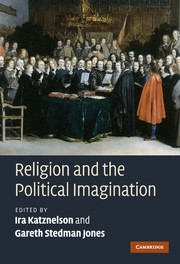Book contents
- Frontmatter
- Contents
- List of contributors
- Acknowledgements
- Introduction: multiple secularities
- 1 Secularisation: religion and the roots of innovation in the political sphere
- 2 Regarding toleration and liberalism: considerations from the Anglo-Jewish experience
- 3 The Enlightenment, the late eighteenth-century revolutions and their aftermath: the ‘secularising’ implications of Protestantism?
- 4 In the lands of the Ottomans: religion and politics
- 5 The Russian Orthodox Church and secularisation
- 6 The American experience of secularisation
- 7 French Catholic political thought from the deconfessionalisation of the state to the recognition of religious freedom
- 8 Religion and the origins of socialism
- 9 From 1848 to Christian Democracy
- 10 The disciplining of the religious conscience in nineteenth-century British politics
- 11 Colonial secularism and Islamism in North India: a relationship of creativity
- 12 The 1960s
- 13 Gendering secularisation: locating women in the transformation of British Christianity in the 1960s
- 14 Does constitutionalisation lead to secularisation?
- 15 Europe's uneasy marriage of secularism and Christianity since 1945 and the challenge of contemporary religious pluralism
- 16 On thick and thin religion: some critical reflections on secularisation theory
- Index
9 - From 1848 to Christian Democracy
Published online by Cambridge University Press: 05 June 2012
- Frontmatter
- Contents
- List of contributors
- Acknowledgements
- Introduction: multiple secularities
- 1 Secularisation: religion and the roots of innovation in the political sphere
- 2 Regarding toleration and liberalism: considerations from the Anglo-Jewish experience
- 3 The Enlightenment, the late eighteenth-century revolutions and their aftermath: the ‘secularising’ implications of Protestantism?
- 4 In the lands of the Ottomans: religion and politics
- 5 The Russian Orthodox Church and secularisation
- 6 The American experience of secularisation
- 7 French Catholic political thought from the deconfessionalisation of the state to the recognition of religious freedom
- 8 Religion and the origins of socialism
- 9 From 1848 to Christian Democracy
- 10 The disciplining of the religious conscience in nineteenth-century British politics
- 11 Colonial secularism and Islamism in North India: a relationship of creativity
- 12 The 1960s
- 13 Gendering secularisation: locating women in the transformation of British Christianity in the 1960s
- 14 Does constitutionalisation lead to secularisation?
- 15 Europe's uneasy marriage of secularism and Christianity since 1945 and the challenge of contemporary religious pluralism
- 16 On thick and thin religion: some critical reflections on secularisation theory
- Index
Summary
This chapter focuses on the relationship between the processes of secularisation and Catholic religious revival that have shaped Europe's transition to modernity. The chapter falls into two parts. The first explores the deepening tension between an anti-clerical European liberalism at the height of its powers and confidence and a revitalised Catholic Church determined to mobilise the masses of the faithful in support of its objectives. The second part of the chapter explores the dialectical relationship between secular (liberal, republican) and clerical forms of mobilisation. Secularising movements and initiatives, it argues, triggered waves of confessional mobilisation and vice versa. In this process of challenge and response the two processes evolved in tandem. The chapter closes with a reflection on the significance of this paradoxical intertwining of opposed phenomena for the shaping of modern Europe.
Even the most cursory overview of the history of Catholicism in nineteenth-century continental Europe reveals an apparently contradictory state of affairs. On the one hand, church properties were seized and sold off; ecclesiastical privileges (fiscal, political, juridical) were removed or curtailed; clerical authorities came under pressure to retreat from their commanding positions in education and charitable provision; liberal, national, radical and socialist political discourses were marked by an uncompromisingly anti-clerical rhetoric and Masonic and free-thinking associational networks sprang up to combat the influence of church institutions and doctrine over human affairs.
- Type
- Chapter
- Information
- Religion and the Political Imagination , pp. 190 - 213Publisher: Cambridge University PressPrint publication year: 2010
- 5
- Cited by



